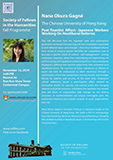

| News & Events |
| 12 November 2019 [Cancellation] | |
Society of Fellows in the Humanities – Fall Programme Nana Okura Gagné Date: November 12, 2019 (Tuesday) Co-sponsored with Department of Japanese Studies |
 |
Abstract: This talk discusses how the Japanese state and corporations promoted neoliberal restructuring and how employees responded to and reflected upon such changes. I show how neoliberal reforms have aimed to produce greater flexibility for corporations and to promote a specific mode of control—‘self-management’—among employees. However, rather than rationalizing and legitimizing risk and becoming self-regulating ‘enterprising selves,’ many employees displayed a reflexive and reactive subjectivity that eschewed such neoliberal values. The reaction of many individuals to reforms in Japan can best be understood as ‘silent resistance’ through a combination of discrete competition, turning inward, and stronger desires for stability and security. At the same time, employees’ critical reflections reveal a post-Toyotist affect marked by retrenched desires for security and control under the changing national and global economy. Ultimately, the Japanese case reveals how the kinds of subjectivities that emerge via the diverse processes of neoliberalization are always contingent upon the multiscalar historical and cultural contexts of work, responsibility, and risk. Bio: Nana Okura Gagné is Assistant Professor in Japanese Studies at the Chinese University of Hong Kong. She holds a PhD in anthropology from Yale University. Her book, Restructuring and Resilience: Changing Men at Work and Play in Neoliberal Japan, is forthcoming with Cornell University Press. Website: www. Sofhku.com |
|